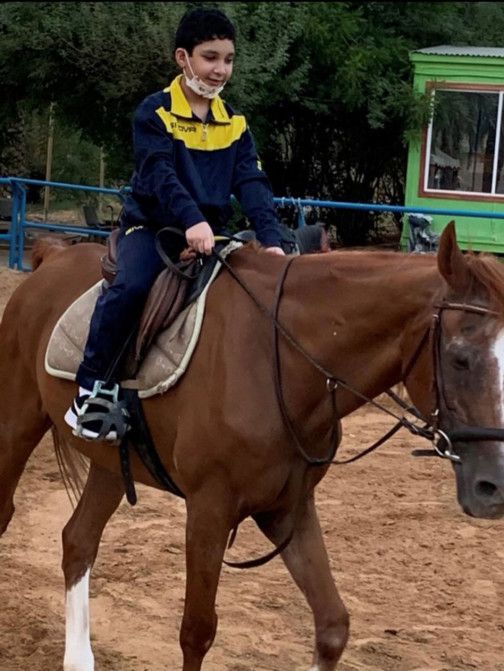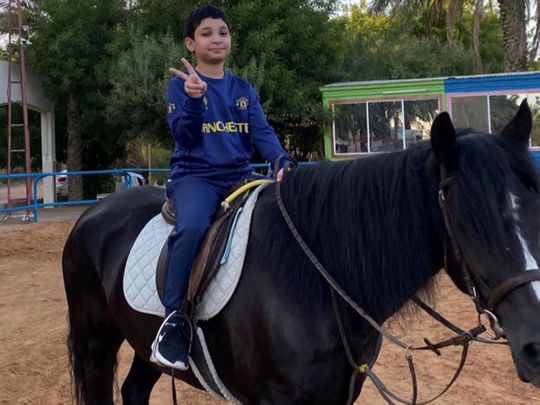Abu Dhabi: Khalifa Al Khyeli knows first-hand the struggles of managing Type 1 diabetes. Diagnosed with the autoimmune disease before the age of four, Al Khyeli had long been plagued by high blood sugar, which made him feel lethargic and left him open to complications.
But his dream to become a champion horse-rider has finally helped him take control of his illness, and in a matter of months. “In late 2019, I saw a video about someone who learnt horse-riding in just 30 days to enter a competition, and it really inspired me to take up the sport. I talked to my mother and I told her that I wanted lessons, and she said I could, as long as my doctor agreed that it would not harm my health,” Al Khyeli said.
His doctor, consultant paediatric diabetologist, Dr Amani Osman at Imperial College London Diabetes Centre, explained that children with poorly managed Type 1 diabetes should avoid exercising until their blood sugar levels are under control. According to medical recommendation, if blood sugar is more than 250 milligrams per decilitre, the patient needs to be extremely cautious about exercising due to the threat of diabetic ketoacidosis.
“Diabetic ketoacidosis is a serious complication that occurs when your blood sugar is very high and acidic substances called ‘ketones’ build up to dangerous levels in your body. If this occurs, it can cause symptoms such as vomiting, abdominal pain and in serious cases, even coma or death. It was therefore vital that Al Khyeli stabilised his blood sugar and had it under control before starting his horse-riding lessons,” Dr Osman said.
Turning point
Al Khyeli gave up his habit of eating erratically — often skipping lunch and secretly buying sweets from a local shop — and, instead, began to follow his doctor’s dietary advice to the letter. With the help of his family, he stuck to regular mealtimes, avoided processed and sugary foods, and counted the carbohydrates he was eating so that he could match his dose of insulin accordingly.
His next diabetes test confirmed that his efforts were paying off. “We regularly give patients a haemoglobin A1c (HbA1C) test, which measures blood sugar over the previous three months. The target for children should be a score of around 7.5 per cent, but Al Khyeli’s had always been between 10 and 13 per cent. However, this time, it had already dropped to under 9 per cent, and we expect him to achieve his target very soon,” Dr Osman said.
* Parents or older children can support the child in the management of the condition, especially in the beginning stages, when it can feel overwhelming. Remember to encourage and reward the child for his/her efforts in diabetes monitoring.
* Families can help persuade the child to lead a healthy lifestyle by setting a good example. Healthy eating should be encouraged for the whole family so that the child does not feel excluded.
* A child’s perception of diabetes also plays a crucial role in how they cope with the condition. Parents need to explain that diabetes is not a bad disease, but rather a health condition that requires specific lifestyle and dietary changes, and constant monitoring.
* Encourage children to discuss their feelings, frustrations and experiences freely. Support groups can be a great help too
Source: Dr Amani Osman, Imperial College London Diabetes Centre
Farhat Nasim, Al Khyeli’s mother, said she is impressed by her son’s determination. “When [Al Khyeli] decided that horse riding was what he wanted to do, everyone was saying that he was too sick and could not pull it off. But he was determined that his diabetes was not going to prevent him,” she said.
Dr Osman explained that a supportive family can play a vital role in improving outcomes in children diagnosed with diabetes. “His whole family has made a huge difference and even modified their own lifestyle. His mother and his siblings, Asia and Ahmed, all helped in checking his blood sugar, giving insulin injections and talking to him about the importance of eating healthily,” she said.
Avoiding complications
“It was important that [Al Khyeli] tackled his disease now as there are many complications associated with Type 1 diabetes, including [vision impairment], kidney disease and nerve damage. In addition to the regular HbA1C tests, we also give children a full check-up every year, including their eyes, kidneys, and thyroid. Al Khyeli has recently got the all-clear, so our aim is to bring his HbA1C score down to seven per cent, and keep it there to avoid any future complications,” Dr Osman said.

Image Credit: Supplied
She added that Al Khyeli’s experience demonstrates that a healthy lifestyle, including exercise and a balanced diet, is the cornerstone of a diabetes treatment plan. “While insulin is important, it is not sufficient in itself,” she said.
Al Khyeli is resolute that he will not go back to his old habits. “I used to feel tired all the time, but now I have much more energy, I have noticed the difference in school sports too, whereas in the past, I couldn’t run far before stopping,” he said. “My dream is to become a professional rider, like my older brother Sultan, who has won many awards. I want to have my own horses and I want to be a part of the Royal Stable,” Al Khyeli added.

